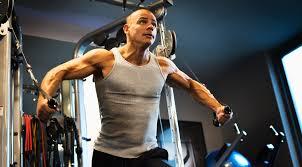In today's fast-paced world, many people are looking for ways to boost their energy levels, improve their muscle mass, and enhance their overall well-being. One popular option that has gained significant attention is the use of testosterone boosters. But the question remains: what age is appropriate to start taking testosterone boosters? In this article, we will explore the factors to consider and provide valuable insights into when it might be the right time to incorporate these supplements into your routine Clicking Here ndtv.com/.
Understanding Testosterone Boosters
Before diving into the age aspect, let's first understand what testosterone boosters are and how they work. Testosterone is a hormone primarily associated with male characteristics, although females also produce it in smaller quantities. It plays a crucial role in muscle growth, bone density, libido, and overall vitality. Testosterone levels tend to peak during adolescence and early adulthood but gradually decline with age.
Testosterone boosters are dietary supplements designed to increase the body's natural production of testosterone. They typically contain a blend of ingredients such as herbs, vitamins, and minerals that are believed to support hormone production.
Factors Influencing Testosterone Levels
Several factors can influence testosterone levels, and these factors may vary from person to person. Here are some key factors to consider:
1. Age
Age is perhaps the most significant factor affecting testosterone levels. As mentioned earlier, testosterone levels naturally decline with age. For men, this decline typically begins around the age of 30 and continues at a rate of approximately 1% per year.
2. Lifestyle
Lifestyle factors such as diet, exercise, and sleep play a crucial role in hormone balance. A sedentary lifestyle, poor nutrition, and lack of sleep can contribute to lower testosterone levels.
3. Medical Conditions
Certain medical conditions, such as hypogonadism, can lead to abnormally low testosterone levels. In such cases, testosterone replacement therapy may be recommended by a healthcare provider.
4. Genetics
Genetics also play a role in determining an individual's baseline testosterone levels. Some people may naturally have higher or lower levels of this hormone.
The Right Age to Consider Testosterone Boosters
Now that we have a better understanding of the factors that influence testosterone levels, let's address the central question: what age should one consider taking testosterone boosters?
1. Age 30 and Beyond
For most individuals, the age of 30 marks the beginning of a gradual decline in testosterone levels. This decline is a natural part of the aging process and may result in symptoms such as reduced energy, decreased muscle mass, and diminished libido. If you start experiencing these symptoms and your healthcare provider confirms low testosterone levels, it may be a suitable time to consider testosterone boosters.
2. Under Medical Supervision
It's essential to emphasize that the decision to use testosterone boosters should be made in consultation with a qualified healthcare professional. Self-prescribing or using these supplements without medical guidance can have adverse effects. If you suspect low testosterone levels, seek medical advice and undergo appropriate testing before starting any supplementation.
3. Lifestyle Considerations
Before resorting to testosterone boosters, evaluate your lifestyle choices. Are you getting enough exercise, maintaining a balanced diet, and prioritizing sleep? Optimizing these aspects of your life can naturally support healthy testosterone levels and may eliminate the need for supplements.
Conclusion
In conclusion, the appropriate age to consider taking testosterone boosters varies from person to person. While age 30 and beyond is a common starting point due to the natural decline in testosterone levels, it's crucial to prioritize a healthy lifestyle and consult with a healthcare provider before making any decisions regarding supplementation. Your doctor can assess your individual needs and guide you in making the best choices for your overall well-being.
